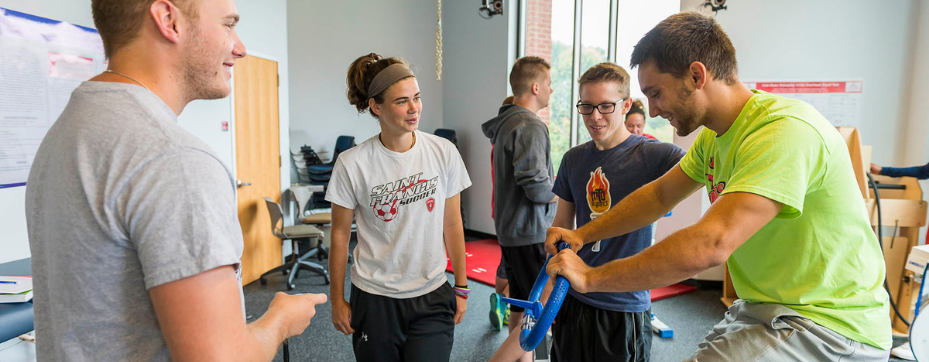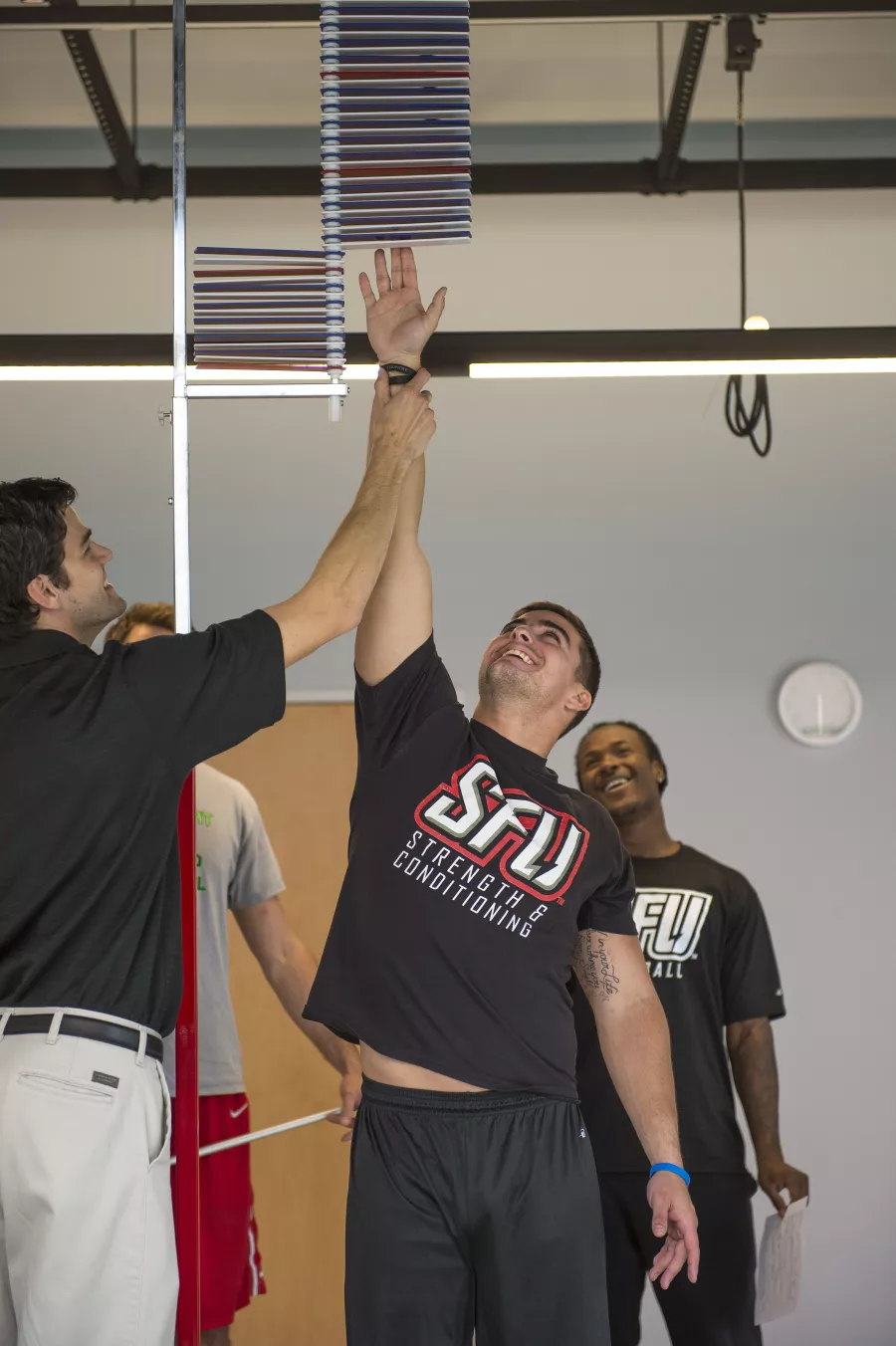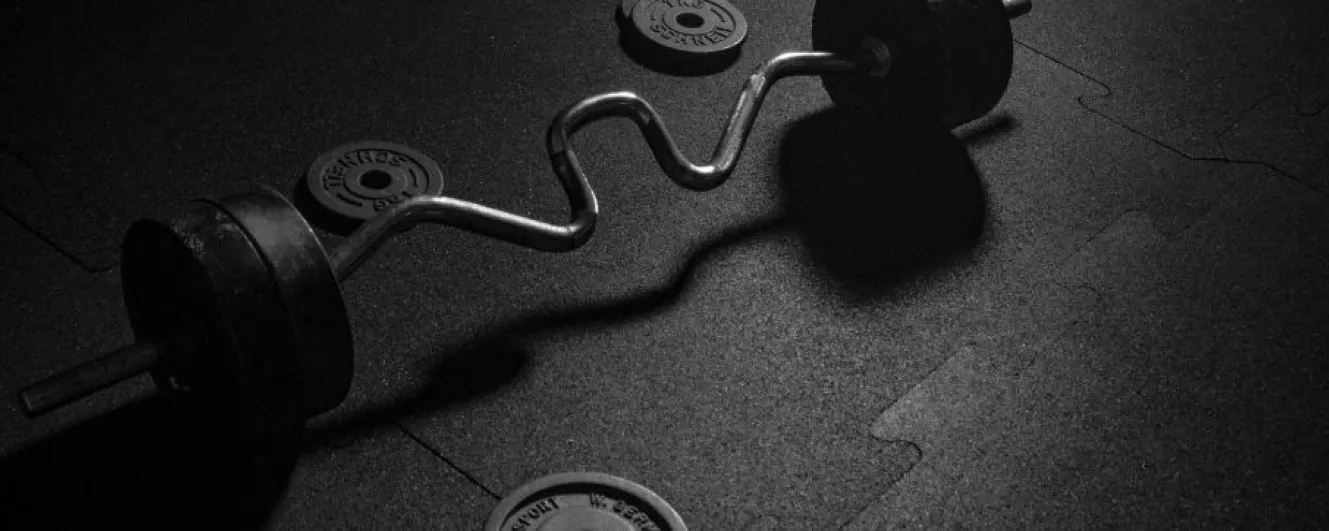
School of Health Sciences and Education
Exercise Physiology, Bachelor of Science
Introduction
Earn an Accredited Exercise Physiology Degree from Saint Francis University
Join one of just eleven CAAHEP-accredited Exercise Science programs in Pennsylvania to achieve your goals of helping people maintain health, fitness, and performance through physical activity.
Our unique, flexible Exercise Science program allows you to choose the degree path that best fits your goals—whether you’re interested in health and wellness, fitness, physical therapy, cancer care, or medicine. Hands-on learning experiences, cutting-edge technology in our state-of-the-art facilities, built-in internship opportunities, multiple concentrations, and accelerated programs will prepare you for your chosen career.
on-campus program
Multiple degree programs and concentrations
Hands-on learning opportunities, including internships
On-campus, state-of-the-art technology and facilities Human Performance Lab | Saint Francis University

The SFU LEARNING EXPERIENCE
Exercise Physiology the Saint Francis Way
Our flexible Exercise Physiology program allows you to tailor your education to align with your career goals. We are dedicated to providing practical, hands-on experiences for our students.

Our Exercise Physiology program offers:
- Accelerated, direct entry pathways to our Doctor of Physical Therapy or a Master of Science in Exercise Oncology.
- Learning opportunities both on campus in the classroom and off-campus in the community plus opportunities for internships and clinical experiences.
- Can choose concentrations and minors that take a multidisciplinary approach to prepare you for a wide variety of career opportunities.
The Exercise Physiology Student Experience
If you are passionate about working with people and improving their quality of life through a better understanding and application of human movement the Exercise Physiology program at Saint Francis University has many opportunities for you.
Here are some of the experiences that our students enjoy:
- Hands-on learning in the community built into the curriculum: As part of your courses, you will work with members local communities -from children to older adults. We take the concept of "learn by doing" to a higher level.
- Networking & Research Opportunities: You will have the opportunity to participate in professional activities including attending and presenting your research at professional conferences such as the Mid-Atlantic Regional Chapter of the American College of Sports Medicine
- The EXPO Club: Not only can you join a student-run social club to talk about all things exercise, but also to serve as a fundraising and outreach organization for students in the major.
- State-of-the-art facilities: Students can provide hands-on, supervised exercise interventions to clients through our on-campus Human Performance Lab and Fitness Center in the DiSepio Institute for Rural Health and Wellness.
CURRICULUM & COURSES
What You’ll Learn in the Undergraduate Exercise Physiology Program
To learn what it takes to become an exercise physiologist, you'll study the physiological responses to physical activity, and then apply this knowledge as they work to improve or maintain a patient’s health, fitness, and performance. Our program takes a multidisciplinary approach to focus your studies based on your specific career goals. Our focus on hands-on, practical education will also prepare you for the workforce with internship and clinical opportunities.
Undergraduate Exercise Physiology Degree Paths:
| Degree Path | Description | Course Catalog | Plan of Study |
|---|---|---|---|
Exercise Physiology, B.S.
| flexible program allows students to focus on post-baccalaureate goals | Course Catalog - 25/26 | |
| Concentrations | Description | Course Catalog | Plan of Study |
| Pre-Medicine Concentration | prepare for medical school | Course Catalog - 25/26 | Plan of Study |
| Minors | |||
| Diving | Course Catalog -25/26 | ||
| Exercise Physiology | Course Catalog - 25/26 | ||
| Movement Science | Course Catalog - 25/26 |
Accelerated/Direct Entry Graduate Paths:
| Degree Path | Description | Course Catalog | Plan of Study |
|---|---|---|---|
3+3-year Exercise Physiology leading to Doctor of Physical Therapy
| 3 years of pre-professional studies and 3 years of professional study in the DPT program | Course Catalog - 25/26 | Plan of Study |
| 4+3-year Exercise Physiology leading to Doctor of Physical Therapy | 4 years of pre-professional studies and 3 years of professional study in the DPT program | Course Catalog - 25/26 | Plan of Study |
As a Graduate of Our Exercise Physiology Program, You Will Have an Impact! You Will be Able to:
- Assess a clients readiness for participation in a fitness or exercise program
- Determine safe and effective exercise programs for clients and assess their results to develop exercise prescriptions
- Optimize adoption of, and adherence to, exercise and other healthy behaviors through communication, motivation, and behavioral strategies
- Develop and disseminate risk management guidelines for a health/fitness facility to reduce member, employee, and business risk
Saint Francis Offers State-of-the-Art Facilities Along with Equipment & Technology:
| Name of Facility | Description |
| DiSepio Institute for Rural Health & Wellness | The 30,000-square-foot facility promotes health and rehab services to members of the SFU community and members of our surrounding communities |
| Evergreen Exercise Clinic of the Center for Rural Cancer Survivorship (CRCS) | Comprehensive interdisciplinary center that provides outpatient services to all cancer patients and survivors in need |
| Human Performance Lab | Outfitted with equipment & technology not found at any other location in the region
|
| Equipment & Technology Name | Description |
| Body Composition (Bod Pod, InBody770) | A device used to determine what your body weight is made of (i.e., fat mass, lean body mass, muscle mass) and estimate resting energy expenditure. |
| Cardiovascular-Metabolic System | Analyzes the exercise capacity, energy expenditure, and risk of developing chronic disease |
| Anaerobic Testing Cycle Ergometer | Tests sprinting ability, fatigue resistance and estimates muscle fiber type and distribution |
| Biodex Isokinetic Dynamometer | Evaluates strength in all major muscle groups of the body |
| NeuroCom Dynamic Posturography | Assists in the determination of risk for falling and balance impairments |
| DARI Motion Capture | A new markerless motion analysis system that can assess athletic readiness to help prevent injuries. Overview |
| Vicon Motion Capture | Analyzes human movement and injury risk |
| Kistler Force Plates | Provides an in-depth analysis of force production during a variety of activities |
| Muscle Sound Ultrasound | Provides a detailed look at the size and quality of your muscles |
Accreditation
The Exercise Physiology Program at Saint Francis University has been continuously accredited since January 16, 2014, by the Commission on Accreditation of Allied Health Education (CAAHEP)
.jpg)
CAAHEP is the largest programmatic accreditor in the health sciences field. CAAHEP reviews individual education programs to make sure they meet the standards of the profession. The CAAHEP standards by which these programs are measured have been developed primarily by the professionals involved in each discipline, are approved by each profession, and are intended to reflect required knowledge and skills that a person needs to be able to successfully function within that profession. CAAHEP standards focus on quality outcomes, ensuring that educational programs are preparing competent entry-level healthcare professionals. That means that CAAHEP-accredited programs provide the educational foundation necessary to begin a successful career in many allied health professions. Earning a degree from an accredited program affirms that the quality of the educational experience you've received meets the standards of the profession.
Exam Pass and Placement Rates
| National Certification Exam Performance | |
Year of Graduation | SFU First-Time Pass Rates | National First-Time Pass Rates |
2025 | ACSM EPC = 100% (6/6) | Not yet reported |
NSCA CSCS Full Exam = 43% (3/7) | Not yet reported | |
Total = 69% |
| |
| ||
2024 | ACSM EPC = 83% (10/12) | ACSM EPC = 70% |
NSCA CSCS Full Exam = 38% (3/8) | NSCA CSCS = 39% | |
Total = 65% |
| |
| ||
2023 | ACSM EPC = 100% (12/12) | ACSM EPC = 67% |
NSCA CSCS Full Exam = 11% (1/9) | NSCA CSCS = 37% | |
Total = 62% |
| |
| ||
Three-Year Average | ACSM EPC = 94% | ACSM EPC = 67% |
NSCA CSCS = 30% | NSCA CSCS = 38% | |
Total = 65% |
| |
| ||
All-Time Average (2014 – 2025) | ACSM EPC = 97% | |
NSCA CSCS = 74% | ||
Total = 89% | ||
| Graduate Placement Rates | |||
Year of Graduation | Survey Response | Continued Education within 1 year | Employed | Total Placement |
2024 | 94% (16/17) | 88% (15/17) | 29% (5/17) | 94% (16/17) |
2023 | 95% | 79% | 37% | 95% |
2022 | 100% | 86% | 14% | 100% |
Three-Year Average | 96% | 84% | 27% | 96% |
All-Time Average (2014 – 2025) |
| 95% | ||

Benefit from Our Experienced Exercise Physiology Faculty
The SFU Exercise Physiology faculty are life-long scholars and teachers who are dedicated to building a strong foundation in the classroom and blending it with practical hands-on skills.
Kristofer S. Wisniewski, Ph.D., RCEP, CET, EIM, CSCS
Associate Professor and Chairperson
Department of Exercise Physiology
Director, Evergreen Exercise Clinic
Center for Rural Cancer Survivorship
Assistant Director, Human Performance Laboratory
DiSepio Institute for Rural Health & Wellness
Co-Chair, Institutional Review Board
814.471.1132
kwisniewski@francis.edu
Career Outlook in Exercise Physiology
Career paths in Exercise Physiology are varied, ranging from athletic trainers, strength and conditioning coaches, and fitness program directors to physical therapists, clinical exercise physiologists, and cardiopulmonary rehabilitation specialists, among others. Those who graduate with a bachelor’s degree in Exercise Physiology are often employed in the fitness industry, while master’s and doctoral students typically find clinical, research, or teaching positions. Whichever degree you choose, the Bureau of Labor Statistics reports that job growth is above average for these industries. With our program’s variety of options, you can choose the path that is right for you!
Salary Potential:
| Profession | 2016 Projected Employment | 2026 Change | Percent Growth | Numeric | Median Salary as of May 2020 |
| Exercise Physiologist | 15,100 | 17,100 | 13% | 2,400 | $50,280 |
| Athletic Trainers | 27,800 | 34,100 | 23% | 7,000 | $49,860 |
| Physical Therapists | 239,800 | 306,900 | 21% | 49,100 | $91,010 |
Orthotists and Prosthetists (2018-28) | 9,100 | 10,900 | 20% | 1,800 | $69,120 |
What can I do with an exercise science degree?
U.S. Bureau of Labor Statistics-occupational outlook
Growth Industry:
- Growth, according to the Bureau of Labor Statistics:
- Growth in Exercise Physiology is expected to increase at a rate of 13% from 2020-2030- faster than the average for all occupations.
- Physical Therapy is expected to grow by 21%, which is much faster than average, over the 10-year period.
- Athletic Training is expected to grow 23% for the same time period.
SFU Grads have had successful careers in:
- Clinical Exercise Physiology / Cardiopulmonary Rehabilitation
- Athletic Training
- Strength and Conditioning Coaching
- Health and Fitness Programming
- Physical Therapy
- Personal Training
- Exercise Oncology
FAQs
Frequently Asked Questions About Exercise Physiology and Saint Francis University
-
With a degree in Exercise Physiology, you can become that someone who changes the face of:
- Clinical Exercise Physiology/Cardiopulmonary Rehabilitation
- Athletic Training
- Strength and Conditioning
- Health and Fitness Programming
- Physical Therapy
- Personal Training
- Exercise Oncology
-
Yes! Robust internships are available in the following areas:
- Athletic Training
- Cardiac Rehabilitation
- Exercise Oncology
- Community Health & Wellness
- Fitness Facility Management
- Pulmonary Rehabilitation
- Research
- Sports Performance Enhancement
- Strength and Conditioning
-
Accreditation ensures that a program meets specific standards and guidelines to assure that healthcare personnel are well-prepared and qualified.
With a degree in Exercise Physiology, you can become that someone who changes the face of:
- Clinical Exercise Physiology/Cardiopulmonary Rehabilitation
- Athletic Training
- Strength and Conditioning
- Health and Fitness Programming
- Physical Therapy
- Personal Training
- Exercise Oncology
Yes! Robust internships are available in the following areas:
- Athletic Training
- Cardiac Rehabilitation
- Exercise Oncology
- Community Health & Wellness
- Fitness Facility Management
- Pulmonary Rehabilitation
- Research
- Sports Performance Enhancement
- Strength and Conditioning
Accreditation ensures that a program meets specific standards and guidelines to assure that healthcare personnel are well-prepared and qualified.